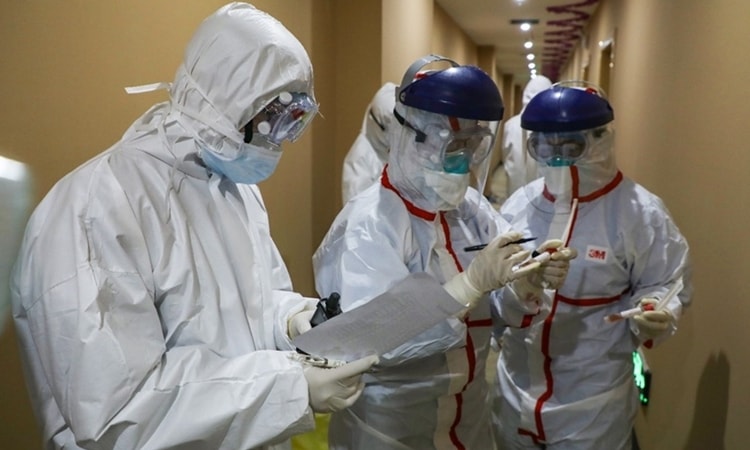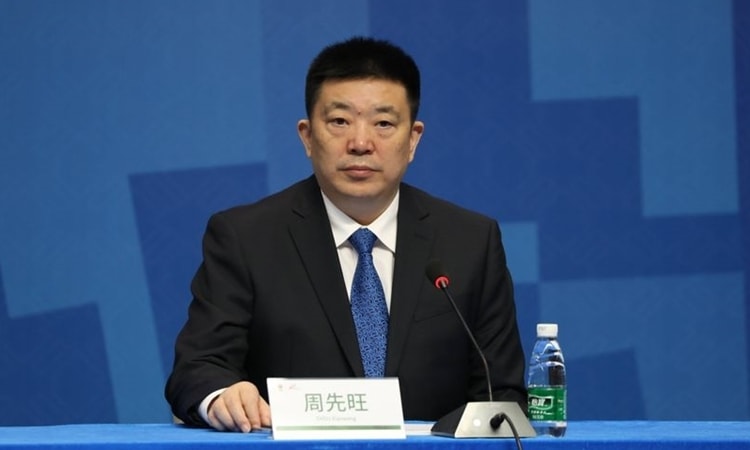Amid the nCoV pandemic, Chinese officials 'pass the ball' of responsibility
Wuhan mayor blames superiors, while top government expert says public misunderstands coronavirus
As China battles the novel coronavirus (nCoV) outbreak that has killed 492 people and infected more than 24,000, people in the country are wondering what the problem is with the outbreak and its spread on such a large scale.
Meanwhile, senior officials have publicly blamed each other or the “bureaucratic system” for failing to act quickly enough to contain the outbreak. Many officials have denied responsibility to the point that some Chinese social media users have joked they are watching a “blame game.”
|
Medical staff holding nCoV test samples in Wuhan on February 4. Photo:AFP. |
"The most important problem exposed in this epidemic is the passivity and inaction of local authorities," said Xu Kaizhen, a writer specializing in Chinese politics.
Mr. Hua said that under the intense pressure of the anti-corruption campaign initiated by Chinese President Xi Jinping, most officials from the central to local levels are only interested in protecting themselves. "They do not want to be the first to speak up. They wait for their superiors to make decisions and are only responsible to their superiors instead of the people," he said.
The Chinese central government appears to be aware of this problem. The Politburo Standing Committee of the Communist Party of China acknowledged on February 3 that there were shortcomings and difficulties in the response to the epidemic. Mr. Xi said the epidemic was "a major test of China's system and governance capacity."
Doubts about the Chinese government's ability to manage the outbreak have grown as social media users have accused Wuhan officials of deliberately "covering up" the outbreak when it emerged in early December 2019.
Wuhan Mayor Zhou Xianwang later admitted he had not disclosed the scale and risk of the outbreak earlier because he needed permission from his superiors. But while he could not share much information, he could have advised people to wear masks, wash their hands frequently and stop large gatherings like the banquet attended by more than 40,000 families just days before the city of 11 million was locked down.
|
Wuhan Mayor Zhou Xianwang. Photo:VGC. |
When information began trickling out, it was vague and misleading. In a series of online announcements between December 31, 2019, and January 17, 2020, Wuhan officials said they were treating pneumonia patients, but did not specify when or how many.
China's National Health Commission, the agency with the authority to declare an emergency, did not issue a notice about the outbreak until January 19. But the notice essentially blamed local authorities. The first sentence of the notice cited a rule requiring the commission to work with local officials on epidemic prevention.
The government’s top medical adviser, Wang Guangfa, who led a team of researchers sent by Beijing to Wuhan to investigate the situation, reassured the public on January 11 that the outbreak was controllable. But he later contracted the virus himself.
After recovering, Wang explained that he had little information at the time. However, Wang also said that the public misunderstood what he meant, meaning that most infectious diseases are eventually brought under control.
In an interview with state television, Wuhan Party Secretary Ma Guoqiang said Wuhan residents were "a little worried" and promised to mobilize all city party committees to cheer them up.
"However, the most important source of spiritual encouragement comes from General Secretary Xi Jinping," Mr. Ma said.
Mr Xu said Secretary Ma's remarks showed that Wuhan officials were more concerned with pleasing their superiors than caring for the people. "If they could sort out their own internal affairs, we would see a very different style of governance," he said.
The local government’s response to the crisis has also been fraught with inadequacies. Coronavirus patients were brought to hospitals in Wuhan in early December 2019, but it was not until seven weeks later that the city government issued a lockdown order on January 23. By this time, about 5 million Wuhan residents had left the city, traveling to other places to visit relatives and travel for the Lunar New Year.
Many cities and provinces are tracking down people from Wuhan, even chasing away those who have been to Hubei province, to prevent the virus from spreading. While closely monitoring those at risk of infection is a sensible policy, punishing or arresting them risks driving them into hiding, complicating efforts to contain the outbreak.
Even in places that are not the epicenter of the outbreak, local officials have imposed regulations that put people in difficult situations. A video that has been widely shared online shows a couple stranded on a bridge connecting Guizhou province with Chongqing city, as Guizhou and Chongqing authorities have banned people from both places from crossing. The wife, who is from Guizhou, and the husband, who is from Chongqing, have nowhere to go.
On social media, lower-level officials complained that they received so many instructions from their superiors that they spent most of their time completing paperwork instead of doing their actual work. In a social media post titled “Formalism Under the Mask,” an anonymous author wrote that “most people in the administrative system do not work to solve problems, they work just to get their responsibilities done.”
|
Countries with patients infected with Corona virus. Click on the image to see the full picture. |
According to commentator Li Yuan ofNYTimesAfter the epidemic ends, China's leaders will likely punish some officials to save face and regain people's trust. But for those who have suffered from the epidemic and poor governance, restoring their trust will be very difficult.
"I know the country will soon return to a peaceful and prosperous society. We will hear many people shouting how proud they are of the country's prosperity and strength," one Wuhan resident wrote on Weibo. "But after what I have seen, I refuse to watch the applause and praise."




